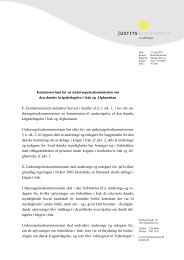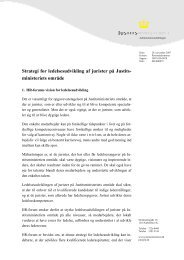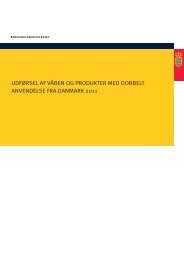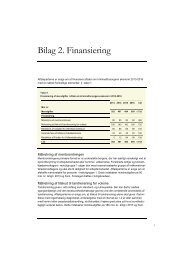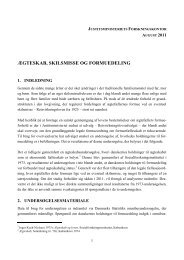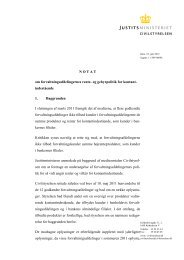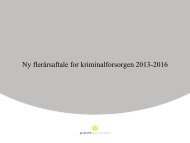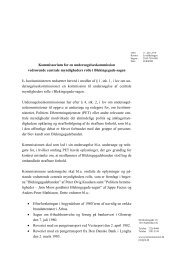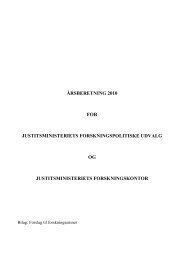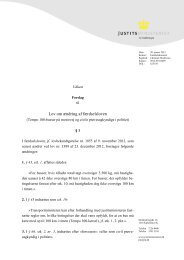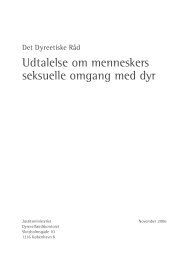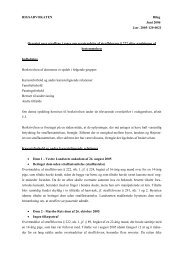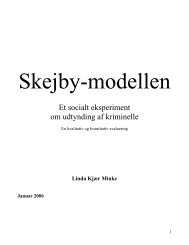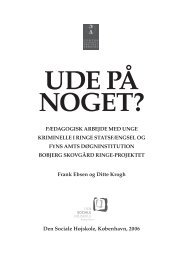Bedste besvarelse af prisopgaven for 2009 - Justitsministeriet
Bedste besvarelse af prisopgaven for 2009 - Justitsministeriet
Bedste besvarelse af prisopgaven for 2009 - Justitsministeriet
Create successful ePaper yourself
Turn your PDF publications into a flip-book with our unique Google optimized e-Paper software.
VIII. English Summary<br />
Recent years have shown an increase in the number of cases concerning public employee’s<br />
accepting gifts or benefits potentially conflicting with article 144 of the Danish penal code. In<br />
accordance with article 144, it is illegal <strong>for</strong> an employee of the Danish, <strong>for</strong>eign or international<br />
public service or duty, to receive or demand an undue gift or other benefit. Conversely there are<br />
exceptions to this. Under certain circumstances the acceptance of a gift or benefit will not be a<br />
breach of article 144; nevertheless it may still be subject to criticism, whereas in other situations<br />
an acceptance might not even give reason to warrant such criticism.<br />
The cases in question have concerned concert tickets and golf and football trips among other<br />
such benefits. Interestingly these cases often have their origins in situations, where the private<br />
party supplying the gift and the public employee accepting the gift have a relationship similar to<br />
that of private business associates. Such a relation does not seem appropriate, when one party is<br />
employed in the public sector; albeit this is the case <strong>for</strong> many public employees, who have a<br />
relatively close connection to the private business environment through their work.<br />
This thesis examines where the line between bribery and the legitimate acceptance of gifts<br />
and other benefits in the public sector is to be drawn in these situations. This is done by an<br />
examination of the relevant parts of the penal code, with emphasis on article 144. Other laws<br />
with a relevant relation to the subject will also be used in this context. This mainly includes<br />
administrative and tax legislation.<br />
The legal text in itself is used <strong>for</strong> the examination, as well as motives, declarations and similar<br />
legal documents in relation to the implementation and changes of the law. The legal litterateur<br />
and jurisprudence has also been used and weighted heavily in the assessment of the subject.<br />
Via an examination and comparison of the legal area, it is found that there is room <strong>for</strong><br />
questions and there<strong>for</strong>e uncertainty in relation to two aspects. One is the assessment of whether<br />
a specific acceptance has the necessary link to the public service or duty, which is requirement in<br />
accordance with article 144. Secondly is the assessment of whether the gift or benefit in question<br />
is to be considered insignificant and there<strong>for</strong>e not undue and not within the grasp of article 144.<br />
The thesis concludes that there cannot be drawn a specific line between bribes and legitimate<br />
acceptance of gifts or benefits in these situations, where public employees interact with private<br />
business associates. Nevertheless the examination has defined the area further. In order to<br />
determinate if such gifts or benefits are legitimate, the financial value and significance of the gift<br />
77



